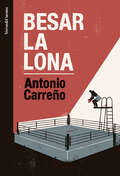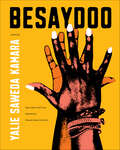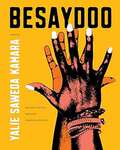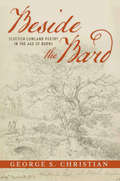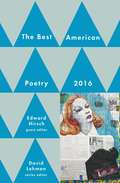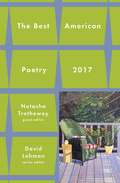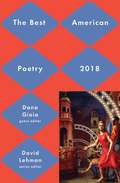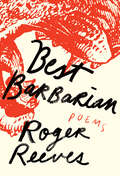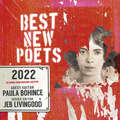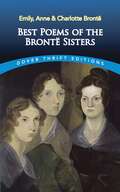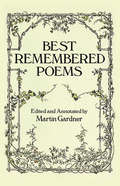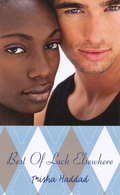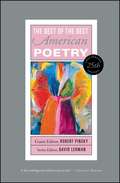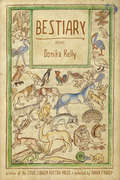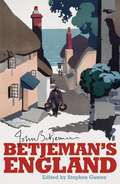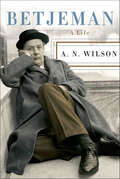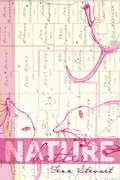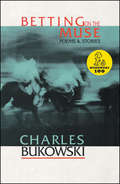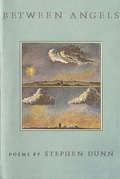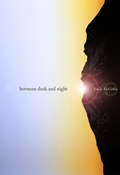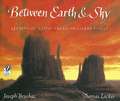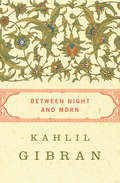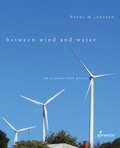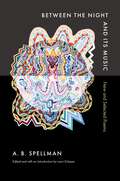- Table View
- List View
Besar la lona
by Antonio CarreñoUn brillante golpe de efecto en formato poema, un canto a los perdedores, a los actores secundarios, a los vencidos...Porque también hay épica en la derrota. A un lado del cuadrilátero, con calzón azul y casi 6000 trillones de toneladas, el mundo. Y al otro lado estás tú.Se intuye un combate desigual.Y es cierto: vas a acabar besando la lona. Pero quizás después de leer este libro lo puedas ver con mis ojos:Besar la lona no es caer, es darle las gracias al suelo. Antonio Carreño reivindica a través de una escritura brillante y de golpe de efecto la importancia del segundo plano, la épica de la derrota, la grandeza de los actores secundarios y de los perdedores. Porque aprender a volar exige muchas horas de suelo. Críticas:«He de reconocer que, a estas alturas de la representación, creía impensable que ningún meteorito poético hiciera impacto en mí, pero el cabrón de Antonio lo ha conseguido. En el centro del pecho. Touché (...) Tras deglutir hipnotizado la lengua de Antonio, tengo la sensación de que Carreño estaba ahí desde el primer momento, justo a mi lado, los dos a la sombra del triunvirato vencedor, pero que, paradójica e inexplicablemente, nunca habíamos enfrentado nuestras miradas».Del prólogo de Kutxi Romero
Besaydoo: Poems
by Yalie Saweda KamaraSelected by Amaud Jamaul Johnson for the 2023 Jake Adam York Prize, Yalie Saweda Kamara’s Besaydoo is an elegantly wrought love song to home—as place, as people, as body, and as language.A griot is a historian, a living repository of communal legacies with “a story pulsing in every blood cell.” In Besaydoo, Kamara serves as griot for the Freeborn in Oakland, the Sierra Leonean in California, the girl straddling womanhood, the woman re-discovering herself. “I am made from the obsession of detail,” she writes, setting scenes from her own multifaceted legacy in sharp relief: the memory of her mother’s singing, savory stacks of lumpia, a church where “everyone is broken, but trying.” A multitudinous witness. Kamara psalms from the nexus of many languages—Krio, English, French, poetry’s many dialects—to highlight mechanisms not just for survival, but for abundance. “I make myth for peace,” she writes, as well as for loss, for delight, for kinship, and most of all for a country where Black means “steadfast and opulent,” and “dangerous and infinite.” She writes for a new America, where praise is plentiful and Black lives flourish.But in Besaydoo, there is no partition between the living and the dead. There is no past nor present. There is, instead, a joyful simultaneity—a liberating togetherness sustained by song.
Besaydoo: Poems (Jake Adam York Prize Ser.)
by Yalie Saweda KamaraSelected by Amaud Jamaul Johnson for the 2023 Jake Adam York Prize, Yalie Saweda Kamara’s Besaydoo is an elegantly wrought love song to home—as place, as people, as body, and as language. A griot is a historian, a living repository of communal legacies with “a story pulsing in every blood cell.” In Besaydoo, Kamara serves as griot for the Freeborn in Oakland, the Sierra Leonean in California, the girl straddling womanhood, the woman re-discovering herself. “I am made from the obsession of detail,” she writes, setting scenes from her own multifaceted legacy in sharp relief: the memory of her mother’s singing, savory stacks of lumpia, a church where “everyone is broken, but trying.” A multitudinous witness. Kamara psalms from the nexus of many languages—Krio, English, French, poetry’s many dialects—to highlight mechanisms not just for survival, but for abundance. “I make myth for peace,” she writes, as well as for loss, for delight, for kinship, and most of all for a country where Black means “steadfast and opulent,” and “dangerous and infinite.” She writes for a new America, where praise is plentiful and Black lives flourish. But in Besaydoo, there is no partition between the living and the dead. There is no past nor present. There is, instead, a joyful simultaneity—a liberating togetherness sustained by song.
Beside the Bard: Scottish Lowland Poetry in the Age of Burns (Transits: Literature, Thought & Culture 1650-1850)
by George S. ChristianBeside the Bard argues that Scottish poetry in the age of Burns reclaims not a single past, dominated and overwritten by the unitary national language of an elite ruling class, but a past that conceptualizes the Scottish nation in terms of local self-identification, linguistic multiplicity, cultural and religious difference, and transnational political and cultural affiliations. This fluid conception of the nation may accommodate a post-Union British self-identification, but it also recognizes the instrumental and historically contingent nature of “Britishness.” Whether male or female, loyalist or radical, literati or autodidacts, poets such as Alexander Wilson, Carolina Olyphant, Robert Tannahill, and John Lapraik, among others, adamantly refuse to imagine a single nation, British or otherwise, instead preferring an open, polyvocal field, on which they can stage new national and personal formations and fight new revolutions. In this sense, “Scotland” is a revolutionary category, always subject to creative destruction and reformation. Published by Bucknell University Press. Distributed worldwide by Rutgers University Press.
Best American Poetry 2016 (The Best American Poetry series)
by David Lehman Edward HirschThe premier anthology of contemporary American poetry continues--guest edited this year by award-winning poet Edward Hirsch, a Chancellor of the Academy of American Poets and the president of The John Simon Guggenheim Memorial Foundation.The Best American Poetry series is "a vivid snapshot of what a distinguished poet finds exciting, fresh and memorable" (Robert Pinsky); a guiding light for the mood and shape of modern American poetry. Each year, this series presents essential American verse and the poets who create it. Truly the "best" American poetry has appeared in this venerable collection for over twenty-five years. A poet of decided brilliance since his 1981 debut collection, For the Sleepwalkers, Edward Hirsch curates a thoughtful selection of poetry for 2016 and an Introduction to be savored. Jumpha Lahiri said of Hirsch, "The trademarks of his poems are...to be intimate but restrained, to be tender without being sentimental, to witness life without flinching, and above all, to isolate and preserve those details of our existence so often overlooked, so easily forgotten, so essential to our souls." Hirsch's choices for this collection reflect the soul of poetry in America. As ever, series editor David Lehman opens this year's edition with an insider's guide and a thoughtful contemplation of poetry today.
Best American Poetry 2017 (The Best American Poetry series)
by David Lehman Natasha TretheweyEdited by Pulitzer Prize-winner and nineteenth US Poet Laureate Natasha Trethewey, The Best American Poetry 2017 brings together the most notable poems of the year in the series that offers “a vivid snapshot of what a distinguished poet finds exciting, fresh, and memorable” (Robert Pinsky).Librarian of Congress James Billington says Natasha Trethewey “consistently and dramatically expanded the power” of the role of US Poet Laureate, holding office hours with the public, traveling the country, and reaching millions through her innovative PBS NewsHour segment “Where Poetry Lives.” Marilyn Nelson says “the wide scope of Trethewey’s interests and her adept handling of form have created an opus of classics both elegant and necessary.” With her selections and introductory essay for The Best American Poetry 2017, Trethewey will be highlighting even more “elegant and necessary” poems and poets, adding to the national conversation of verse and its role in our culture. The Best American Poetry is not just another anthology; it serves as a guide to who’s who and what’s happening in American poetry and is an eagerly awaited publishing event each year. With Trethewey’s insightful touch and genius for plumbing the depths of history and personal experience to shape striking verse, The Best American Poetry 2017 is another brilliant addition to the series.
Best American Poetry 2018 (The Best American Poetry series)
by David Lehman Dana GioiaThe 2018 edition of the Best American Poetry—“a ‘best’ anthology that really lives up to its title” (Chicago Tribune)—collects the most significant poems of the year, chosen by Poet Laureate of California Dana Gioia.The guest editor for 2018, Dana Gioia, has an unconventional poetic background. Gioia has published five volumes of poetry, served as the Chairman of the National Endowment for the Arts, and currently sits as the Poet Laureate of California, but he is also a graduate of Stanford Business School and was once a Vice President at General Foods. He has studied opera and is a published librettist, in addition to his prolific work in critical essay writing and editing literary anthologies. Having lived several lives, Gioia brings an insightful, varied, eclectic eye to this year’s Best American Poetry. With his classic essay “Can Poetry Matter?”, originally run in The Atlantic in 1991, Gioia considered whether there is a place for poetry to be a part of modern American mainstream culture. Decades later, the debate continues, but Best American Poetry 2018 stands as evidence that poetry is very much present, relevant, and finding new readers.
Best Barbarian: Poems
by Roger ReevesIn his brilliant, expansive second volume, Whiting Award–winning poet Roger Reeves probes the apocalypses and raptures of humanity—climate change, anti-Black racism, familial and erotic love, ecstasy and loss. The poems in Best Barbarian roam across the literary and social landscape, from Beowulf’s Grendel to the jazz musician Alice Coltrane, from reckoning with immigration at the U.S.–Mexico border to thinking through the fraught beauty of the moon on a summer night after the police have killed a Black man. Daring and formally elegant, Best Barbarian asks the reader: “Who has not been an entryway shuddering in the wind / Of another’s want, a rose nailed to some dark longing and bled?” Reeves extends his inquiry into the work of writers who have come before, conversing with—and sometimes contradicting—Walt Whitman, James Baldwin, Sappho, Dante, and Aimé Césaire, among others. Expanding the tradition of poetry to reach from Gilgamesh and the Aeneid to Drake and Beyoncé, Reeves adds his voice to a long song that seeks to address itself “only to freedom.” Best Barbarian asks the reader to stay close as it plunges into catastrophe and finds surprising moments of joy and intimacy. This fearless, musical, and oracular collection announces Roger Reeves as an essential voice in American poetry.
Best New Poets 2022: 50 Poems from Emerging Writers (Best New Poets)
by Jeb LivingoodAn annual anthology of 50 poems from emerging writers.
Best Poems of the Brontë Sisters (Dover Thrift Editions)
by Candace Ward Brontë Emily Anne"In this collection of their poetry, published under gender-concealing pseudonyms, we get an intimate glimpse of their fears, hopes, faith, and desires." -- Haunted Library"This collection is not only for fans of the Brontë Sisters and classic rhyming poetry but also for readers that crave heartbreaking gothic angst." -- Eastside Middle SchoolAmong the most talented siblings in English literary history, the Brontë sisters are best remembered for their novels: Emily's Wuthering Heights, Charlotte's Jane Eyre, and Anne's Tenant of Wildfell Hall, among other works. It is less well known that the sisters also composed a considerable amount of fine poetry. This volume contains forty-seven poems by all three sisters. Selections include Charlotte's "Presentiment," "Passion," two poems on the deaths of her sisters, and six more. There are twenty-three poems by Emily (considered the best poet of the three), including "Faith and Despondency" and "No Coward Soul Is Mine." The works of all three sisters share the qualities of intelligence, awareness, and heartfelt emotion, expressed in simple, highly readable verse. Gathered in this handy, inexpensive collection, the poems represent a superb introduction to a lesser-known aspect of the Brontës' literary art.
Best Remembered Poems
by Martin GardnerThe 126 poems in this superb collection of 19th- and 20th-century British and American verse range from the impassioned "Renascence" of Edna St. Vincent Millay to Edward Lear's whimsical "The Owl and the Pussycat" and James Whitcomb Riley's homespun "When the Frost Is on the Punkin." Famous poets such as Wordsworth, Tennyson, Whitman, and Frost are well-represented, as are less well-known poets such as John McCrae ("In Flanders Fields") and Ernest Thayer ("Casey at the Bat"). Includes 10 selections from the Common Core State Standards Initiative: "The Owl and the Pussycat," "Casey at the Bat," "Jabberwocky," "O Captain! My Captain!," "Paul Revere's Ride," "Ozymandias," "The Raven," "Because I Could Not Stop for Death," "Mending Wall," and "Ode on a Grecian Urn."
Best of the Best American Poetry: 25th Anniversary Edition
by David LehmanRobert Pinsky, distinguished poet and man of letters, selects the top 100 poems from twenty-five years of The Best American PoetryThis special edition celebrates twenty-five years of the Best American Poetry series, which has become an institution. From its inception in 1988, it has been hotly debated, keenly monitored, ardently advocated (or denounced), and obsessively scrutinized. Each volume consists of seventy-five poems chosen by a major American poet acting as guest editor—from John Ashbery in 1988 to Mark Doty in 2012, with stops along the way for such poets as Charles Simic, A. R. Ammons, Louise Glück, Adrienne Rich, Billy Collins, Heather McHugh, and Kevin Young. Out of the 1,875 poems that have appeared in The Best American Poetry, here are 100 that Robert Pinsky, the distinguished poet and man of letters, has chosen for this milestone edition.
Bestiary: Poems
by Donika KellyDonika Kelly's fierce debut collection, longlisted for the 2016 National Book Award and winner of the 2015 Cave Canem Poetry PrizeI thought myself lion and serpent. Thoughtmyself body enough for two, for we.Found comfort in never being lonely.What burst from my back, from my bones, what livedalong the ridge from crown to crown, from maneto forked tongue beneath the skin. What clamorwe made in the birthing. What hiss and rumbleat the splitting, at the horns and beard,at the glottal bleat. What bridges our back.What strong neck, what bright eye. What menagerieare we. What we've made of ourselves.--from "Love Poem: Chimera"Across this remarkable first book are encounters with animals, legendary beasts, and mythological monsters--half human and half something else. Donika Kelly's Bestiary is a catalogue of creatures--from the whale and ostrich to the pegasus and chimera to the centaur and griffin. Among them too are poems of love, self-discovery, and travel, from "Out West" to "Back East." Lurking in the middle of this powerful and multifaceted collection is a wrenching sequence that wonders just who or what is the real monster inside this life of survival and reflection. Selected and with an introduction by the National Book Award winner Nikky Finney, Bestiary questions what makes us human, what makes us whole.
Betjeman's England
by John Betjeman Stephen GamesFor more than half a century Betjeman's writings have awakened readers to the intimacy of English places - from the smell of gaslight in suburban churches, to the hissing of backwash on a shingle beach. Betjeman is England's greatest topologist: whether he's talking about a townhall or a teashop, he gets to the nub of what makes unexpected places unique. This new collection of his writings, arranged geographically, offers an essential gazetteer to the physical landmarks of Betjeman Country. A new addition to the popular series of Betjeman anthologies, following on from Trains and Buttered Toast and Tennis Whites and Teacakes, this is a treasure trove for any Betjeman fan and for anyone with a love for the rare, curious and unique details of English life.
Betjeman: A Life
by A. N. WilsonJohn Betjeman was by far the most popular poet of the twentieth century; his collected poems sold more than two million copies. As poet laureate of England, he became a national icon, but behind the public man were doubts and demons. The poet best known for writing hymns of praise to athletic middle-class girls on the tennis courts led a tempestuous emotional life. For much of his fifty-year marriage to Penelope Chetwode, the daughter of a field marshal, Betjeman had a relationship with Elizabeth Cavendish, the daughter of the Duke of Devonshire and lady-in-waiting to Princess Margaret. Betjeman, a devout Anglican, was tormented by guilt about the storms this emotional triangle caused.Betjeman, published to coincide with the hundredth anniversary of the poet's birth, is the first to use fully the vast archive of personal material relating to his private life, including literally hundreds of letters written by his wife about their life together and apart. Here too are chronicled his many friendships, ranging from "Bosie" Douglas to the young satirists of Private Eye, from the Mitford sisters to the Crazy Gang. This is a celebration of a much-loved poet, a brave campaigner for architecture at risk, and a highly popular public performer. Betjeman was the classic example of the melancholy clown, whose sadness found its perfect mood music in the hymns of a poignant Anglicanism.
Better Nature
by Fenn StewartMuch of the language that makes up Better Nature—the first poetry collection by writer and academic Fenn Stewart—is drawn from a diary that Walt Whitman wrote while travelling through Canada at the end of the nineteenth century.But rather than waxing poetic about the untouched Great White North, Stewart inlays found materials (early settler archives, news stories, email spam, fundraising for environmental NGOs, and more) to present a unique view of Canada's "pioneering" attitude towards "wilderness"—one that considers deeper issues of the settler appropriation of Indigenous lands, the notion of terra nullius, and the strategies and techniques used to produce a "better nature" (that is, one that better serves the nation).
Betting on the Muse
by Charles BukowskiBetting on the Muse is a combination of hilarious poetry and stories. Charles Bukowski writes about the real life of a working man and all that comes with it.
Between Angels
by Stephen Dunn"Between Angels affirms what we are capable of in our best moments--grace, tenderness, love--while acknowledging that the human heart can be merciless. It's a book of great breadth."--Gregory Djanikian, Philadelphia Inquirer
Between Dusk and Night
by Emily McGiffinThere are many journeys encompassed in the pages of this mature and well-crafted first collection; literal travels to different parts of the world, to Europe and Africa, are the outward manifestation of the inward quest, the asking of the old but still essential questions: What is real? What is true? What is honourable? What is right? Yet these questions are new in that the poet is deeply concerned with the need to find a new paradigm, a new way to relate to the earth at this time of ever-heightening environmental crisis. And this seeking for how to be in and of the earth is paralleled by a personal search for intimacy with her fellow humans.
Between Earth and Sky: Legends of Native American Sacred Places
by Joseph BruchacThrough the guidance of his uncle and the retelling of various Native American legends, a young boy learns that everything living and inanimate has its place, should be considered sacred, and given respect..
Between Night and Morn
by Kahlil GibranA selection of early works by bestselling author Kahlil Gibran offers an accessible introduction to his beautiful language and inspiring worldview The prolific writings of Kahlil Gibran, author of The Prophet, continue to inspire a devoted international following and have transformed modern Arabic literature. In this volume of early writings, Gibran&’s simple yet lyrical style crosses from prose to poetry and yields insight into his dedication and inner vision of beauty, including the tale of a strange hermit in &“The Tempest,&” the discovery of love lost to war in &“The Mermaids,&” and the long voyage of sea and soul in the prose poem &“Between Night and Morn.&” From scathing indictments against worldly wrongs to tender spiritual exultations, Between Night and Morn powerfully evokes the mood and magnetism of Gibran.
Between Wind and Water
by Berni M JanssenAlmost everyone thinks that wind power is a great advance, but it too can be done the wrong way. berni m janssen through an extraordinary series of poems that are both riveting and deeply saddening shares the stories of the people living in an idyllic country area into which wind turbines are erected. The world of nature, birds, trees, flowers as well as wind, water and dust come to life, while the world of those subjected to the body-grinding low-pitched sounds through so many sleepless nights fall apart. berni m janssen is a highly respected performance poet and her starkly visual and visceral poems will leave audiences writhing in disbelief.
Between You and Me: Selected Kannada Poems of G. S. Sivarudrappa
by G. S. Sivarudrappa O. L. NagabhusanasvamiThe poems included in this anthology are selected with a view of representing the range of poet's major concerns.
Between the Night and Its Music: New and Selected Poems (Wesleyan Poetry Series)
by A. B. SpellmanA. B. Spellman is an acclaimed American poet, music critic, and arts administrator. He is widely recognized as a leading figure in the Black Arts Movement of the 1960s and 1970s, a cultural and literary movement that emphasized Black identity, pride, and artistic expression. Between the Night and Its Music brings together A. B. Spellman's early work with a collection of powerful new poems. Spellman's literary career took flight in 1965 with his debut poetry collection, The Beautiful Days, which introduced his distinctive voice blending elements of jazz, blues, and African oral traditions. In 1966, Four Lives in the Bebop Business established Spellman as a respected music critic and scholar. It was a groundbreaking work that chronicled the lives and struggles of four influential jazz musicians. Spellman held senior positions at the National Endowment for the Arts for thirty years with lasting impact on arts funding for inner cities and rural and tribal communities. In addition to poems from The Beautiful Days (1965) and Things I Must Have Known (2008), this book contains a trove of new and uncollected poems, confirming Spellman's continued centrality to contemporary American literature. This is an essential volume for readers already familiar with Spellman, and an excellent introduction for new readers. Lauri Scheyer's introduction situates Spellman's work within jazz writing, Black Arts, and American poetry broadly.[sample text]THE TWISTa dancer's worldis walls, movementconfined: musicgod's last breath.rhythm: the last beating of his heart. a dancerfollows that sound, blindto its source, toward wallswith others. she cannot dance aloneshe thinks of thoughtas windows, as ice around the dancecan you break it? move
